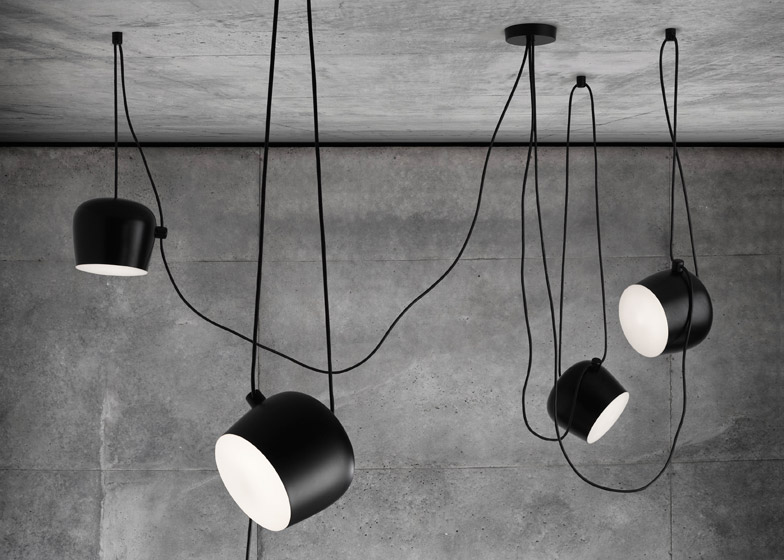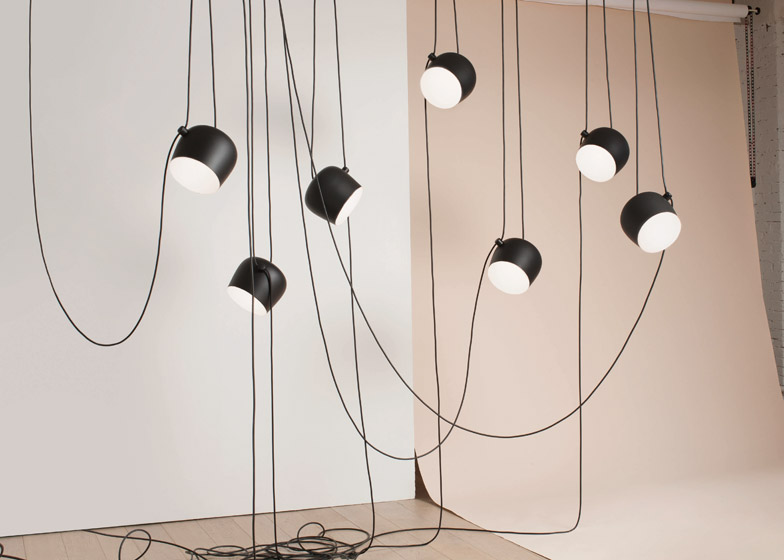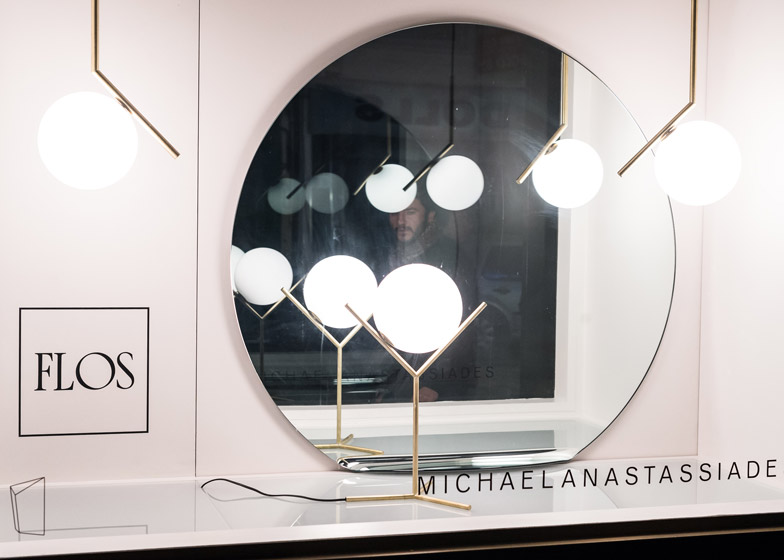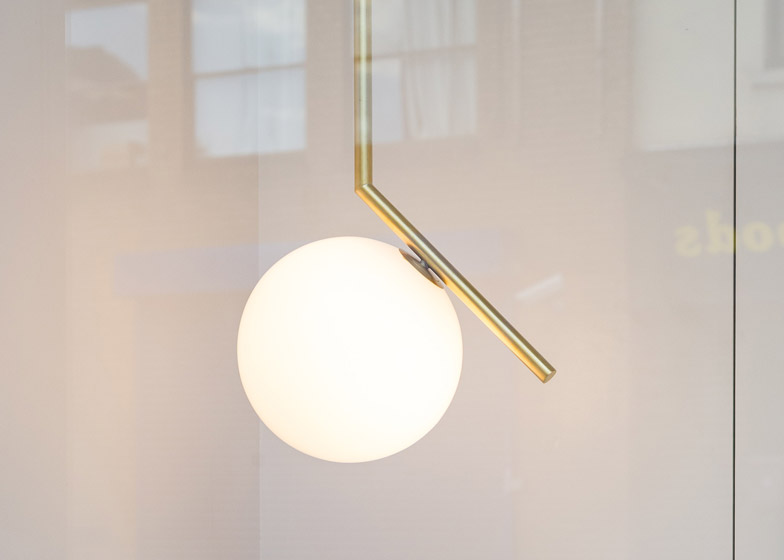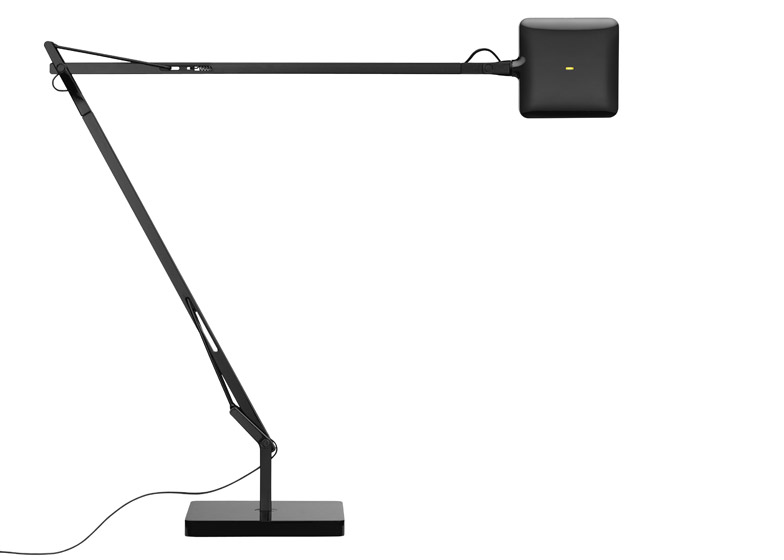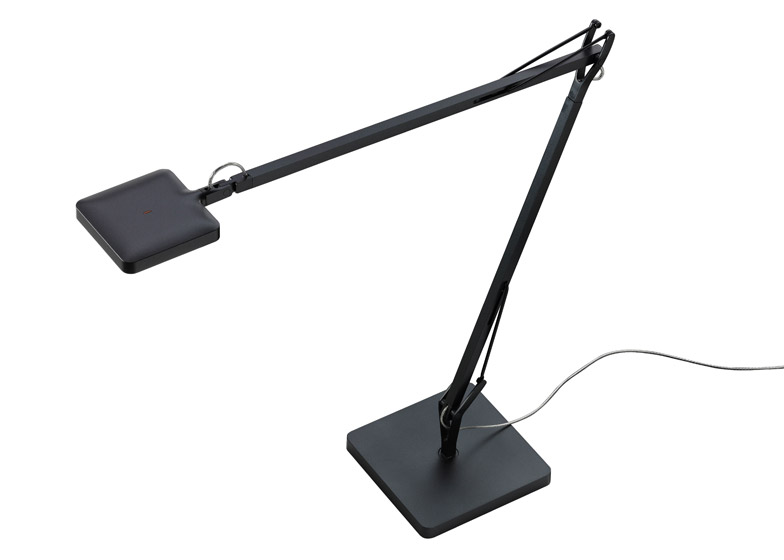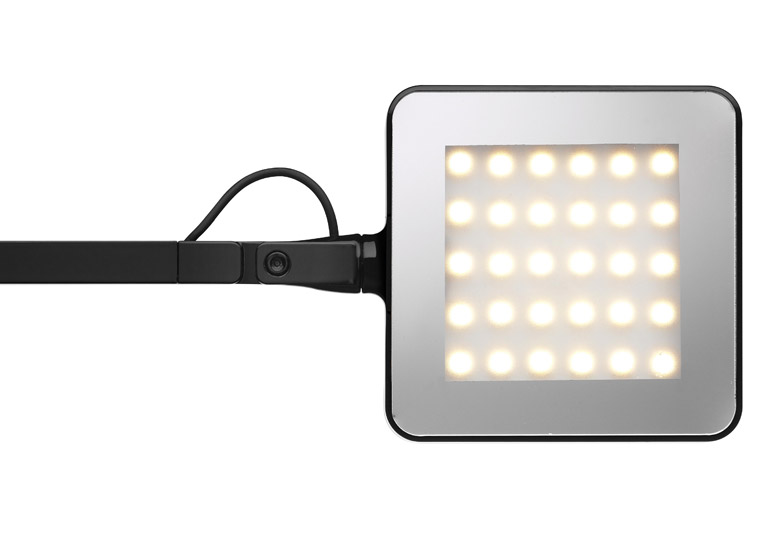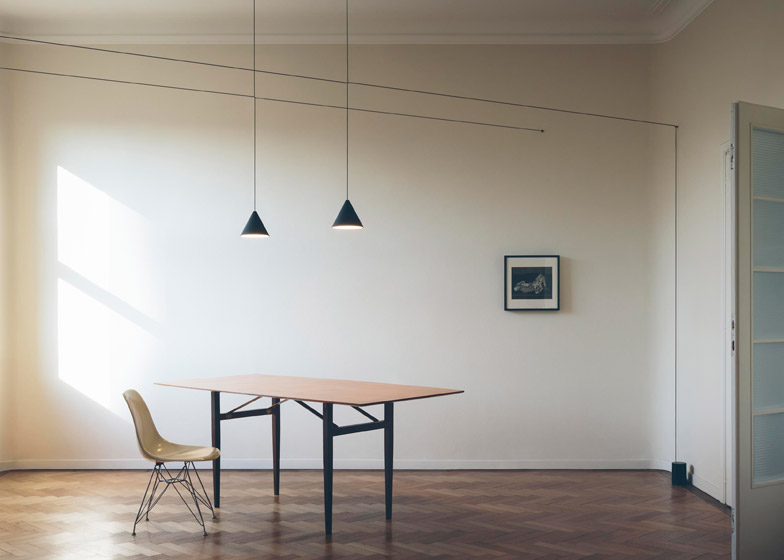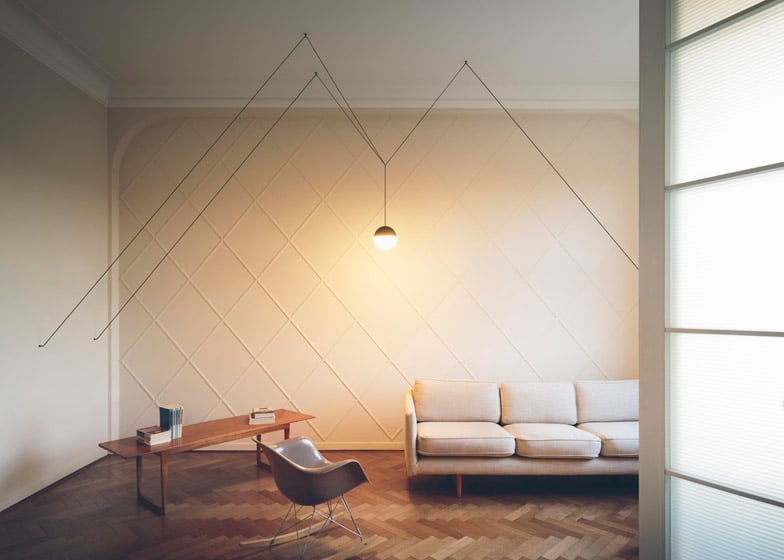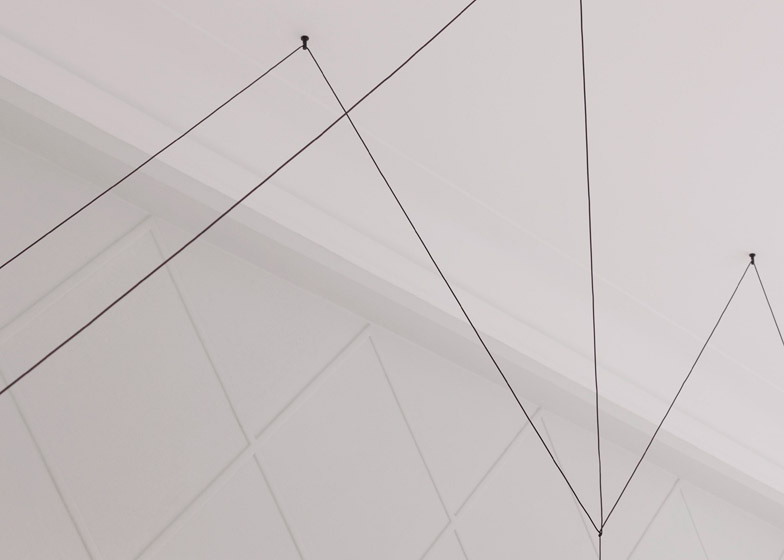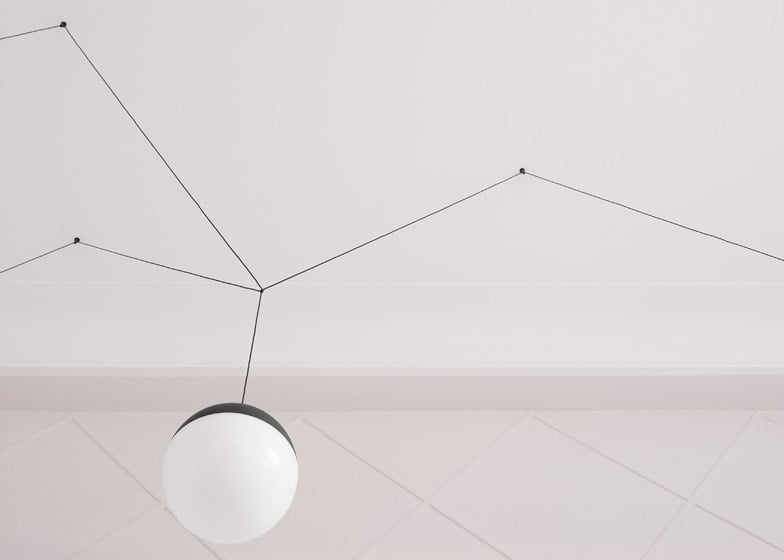Interview: last week Italian lighting brand Flos was sold to a private equity fund. Dezeen spoke to Flos CEO Piero Gandini about the future of his company, of Italian design and of lighting (+ slideshow).
Gandini, son of former CEO Sergio Gandini, sold a controlling stake of the family-run business to Investindustrial, a fund headed by Italian financier Andrea Bonomi.
Speaking to Dezeen in London, Gandini Jr said he felt the time was right to sell the firm since there was no obvious successor within the Gandini family and younger family members "shouldn't be obliged" to take over the reigns.
While many of Italy's family-run design brands have appeared to struggle through the financial crisis, Flos has seen steady growth; Gandini puts this down to a combination of flexibility, liquidity and outsourcing its production.
"We decided not to have our own factories, to always stay liquid, and to be a curious and flexible organisation," Gandini said. "This was our secret."
Gandini spoke about the need for Italian design brands to constantly innovate: "You can't be a design company without being courageous and avant-garde. You are obliged to be good, you are obliged to be visionary."
He discussed radical products he's introduced to the company since joining it in the 1990s, including the radical but cute Miss Sissi lamp by Philippe Starck.
"It was a total break," he said. "Alessi hadn't started yet with its collection of small objects, so there was nothing like that on the market. I remember many people in the company were against this product, including my dad at the beginning."
Gandini also touched on the future of the lighting industry at a time when technology is evolving ever faster. "The point is that we have passed from electricity into electronics," he said. "This is the big change. In ten years it could be something else, but we'll never get back to electricity. Now light interacts with you. There are chips; it's no more just a filament. There is a new world of control and interactions. I think that's the future."
Here's an edited transcript of the interview:
Marcus Fairs: Why did you decide to sell the company?
Piero Gandini: It's a decision that was taken for a lot of reasons; not just one reason. I was considering a way to bring a new story to Flos. We discussed in the last two years whether we could do it ourselves, through organic growth. We were thinking of enlarging our range of products through acquisitions. We are thinking of doing not only lighting eventually. We have a lot of ideas.
Then we started to ask ourselves "Are we going to do this alone? Are we going to do this with somebody? Which is the best way?" It's something that could have been done much later but I think that it's a mistake to sell a company like this when you're 75. This is stupid.
So Flos should be sold sooner rather than later in my opinion because of the family structure that we have: I have three daughters, my sister has two daughters, my minority partner has three sons and another daughter so it's a pretty complicated issue to transfer the company. If [young members of the family] love design and want to work in design you have the chance to do it but they shouldn't be obliged.
Marcus Fairs: Many Italian design companies are still family owned. Is that a strength or a weakness today?
Piero Gandini: I love the fact that Italian companies are driven by families. This can be a fantastic advantage. But it is also sometimes a weak point. It all depends on the people involved, the relationships and the leadership. My daughters and my sister's daughters and my business partner's daughters are too young. The oldest one is 19, which is too young to manage [a company].
Marcus Fairs: How old are you now?
Piero Gandini: I'm 51. At 51 you're in the middle of your thing. [The sale] could be done 10 years later of course. It could be done 20 years later. But it would not be the same. Or it could be done today.
So we explored all the possibilities and then we started to think who could be a potential partner in this story. We met a lot of people, including very big firms.
But at the end we took the decision to do it with a partner, and this partner [Investindustrial] specifically because they are a very robust [private equity] fund and at the same time a kind of family; an Italian family. They are very linked to industry. The first conversations were about the products, not just about the numbers. It's not just because they're Italian but it's a cultural thing so I feel extremely relaxed about it.
Marcus Fairs: How will the deal change Flos?
Piero Gandini: Flos will do the same things as before; it will not change its nature. We will remain a totally devoted and passionate design lighting company. But the intensity will perhaps be a little bit higher.
We didn't do the deal in an extreme way, with crazy leverages that oblige us to grow. The idea is to develop the company, then in maybe six or seven years we can go public. If we go public the family will stay involved and then perhaps we take will control again, who knows?
Marcus Fairs: What are your immediate objectives?
Piero Gandini: I want to accomplish two missions. One is the cultural challenge: to respect and push even more extremely the cultural design challenge, working with the best designers around with an open company to take risks in experimentation and innovation. And the other is to do this without being just an atelier, but being a real company with real financial results. So this is the spirit.
Marcus Fairs: The press has reported that you sold 80% of the company for €400 million. Is that accurate?
Piero Gandini: I won't tell you but they're wrong. But I know you journalists have to put something on paper so don't worry about it.
Marcus Fairs: Why has Flos grown in the last few years when many other Italian design-led brands have struggled?
Piero Gandini: I think it's a combination of things. I think we are a little bit braver than others and a little bit more flexible than others.
The flexibility is a key factor. We live in a world that is constantly changing. As Darwin's rule says, it's not the strongest or the most intelligent that survive, but the ones that adapt to change. So in a company like this with such strong identity and values, the question is how you keep it strong but at the same time flexible to react to what's going on.
We do it in an extremely brave way, doing products that do not look ordinary at all. You never know when a product is going to sell but we never cared about that; we always did it for passion. And we have always kept the company extremely liquid so we have never had financial problems.
And we never produce anything ourselves. Making a big investment in a factory allows you to optimise the cost but in reality, from that day on, your capacity to be flexible is lost. So we decided not to have our own factories, to always stay liquid, and to be a curious and flexible organisation. This was our secret.
Marcus Fairs: Where do you do your manufacturing?
Piero Gandini: We manufacture almost everything between Spain and Italy. We buy some glass in Eastern Europe, because it is less easy today to find glass in Italy so we go to Bohemia. And we buy some electronic components in Asia, but it's mainly between Italy and Spain.
Marcus Fairs: Where has the growth in Flos' business come from?
Piero Gandini: Some markets have grown in the last few years, like the USA. We're increasing our numbers on the Scandinavian markets a lot and we're decreasing much less than the others in Italy.
Plus we've had a very good response from the internet. The internet market could be less easy for the furniture world, but for lighting it's much easier to get into that. We're start to see that internet can really create volumes.
And in certain areas, particularly the United States, we are really seeing [online sales] volumes comparable to brick-and-mortar volumes. This was a surprise to us. We see the internet not as a problem but as potential.
So if you take the internet stuff, the architectural lighting side, the contract potential that you have in the Far East and the Middle East, we have a strong organisation.
Marcus Fairs: Family-run design brands flourished in Italy in the post-war period but many of them seem to be in trouble now. What will happen to them?
Piero Gandini: I think trouble is the wrong word. I think that we have to keep being visionary and courageous, like Flos was when some young designers came into the company with an idea for a lamp that's a suspension lamp but not really, that required as two-metre arc to bring the bulb over the table, and to keep it up it needed a 60kg stone base...
You can't be a design company without being courageous and avant-garde. You are obliged to be good, you are obliged to be visionary. If Italian design companies are losing that capacity, then there is a danger, because your products start to become a little bit normal. And if they are normal then the difference between you and the competition becomes other things; other things that Italians are not necessarily the best at.
So the ones who are not able to keep their bravery and visionary attitude will lose, but other guys will arrive with even more bravery and vision.
A company like ours has something to share. We don't just have something to sell; having something to share is different. If we keep that spirit, Italian design will have a long, long life.
Marcus Fairs: Give me some example of brave and visionary products you've been involved with in your time at Flos.
Piero Gandini: Oh there are so many. I can give you a story. When I was just starting in the company I was "the son of". So there were a lot of eyes on me. It looked easy because I had a privileged entrance, but I only had the privilege to get into the room. From then on I had the problem of everyone looking at me.
Then I did the Miss Sissi [lamp with Philippe Starck]. It was a total break. Alessi hadn't started yet with its collection of small objects, so there was nothing like that on the market. When Starck came to me with this small object that was not even a lamp, which wasn't giving much light, the company were used this super-fantastic culture of projects with the Castiglioni brothers, with Scarpa.
I remember many people in the company were against this product, including my dad at the beginning. But I never thought it was changing Flos; I thought it was confirming Flos. When they did the Arco light there was some beautiful Scandinavia stuff and there were classic chandeliers so they were breaking dramatically the language. And with Miss Sissi we were sending another message: Flos is this. It was a clear example of how you can change.
More recently we did Wall Piercing with Ron Gilad, with all these rings sticking out from the wall, from the architecture. Was it a lamp? Was it decoration? What is it? When Ron sent me the image of that we were shocked by the beauty. We never discussed whether we should do it or not. It's fantastic to work like that.
This doesn't mean that you get into this complex where something has to be extraordinary or unbelievably strange or you don't do it. This is a syndrome that makes you decadent; we also have to deliver solutions.
Marcus Fairs: What are your best-selling products?
Piero Gandini: We have a mix. Some of our best-selling products, not in any particular order, are Kelvin LED, a beautiful object interpreting the LED revolution by Antonio Citterio; Sky Garden, a lamp totally decorated on the inside by Marcel Wanders; Aim by the Bouroullecs, Glo-Ball by Jasper Morrison… there are a lot.
Marcus Fairs: How is the lighting industry changing? What new technologies are on the horizon? What about organic LEDs for example?
Piero Gandini: LEDs are definitely the way lighting is going. Organic LEDs are a different story. You saw that we did the limited-edition Light Photon, the biggest OLED lamp ever produced, with Philippe Stark for the 50th anniversary of Flos in 2012, but I think OLEDs have to find a real industrial application to decrease the cost and make it really viable. It's still very experimental. The day that the automotive industry or the TV-screen industry starts to use them in a massive way, then the costs will come down.
The point is that we have passed from electricity into electronics. This is the big change. In ten years it could be something else, but we'll never get back to electricity. Now light interacts with you. There are chips; it's no more just a filament. There is a new world of control and interactions. I think that's the future.

